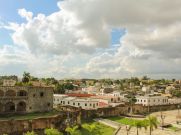Mark G. Brennan is an adjunct associate professor of business ethics in the Business & Society Program at the New York University Stern School of Business, New York, NY 10012; [email protected].
This piece originally appeared in “Instructive Ideas,” a special section in the Fall 2016 Academic Questions (volume 29, number 3).
When did Mick Jagger switch careers? At the end of March, the Rolling Stones lead singer turned political scientist boldly announced, “Times are changing!” to a crowd of adoring fans before launching into eighteen classic Stones hits at a concert.[1] Times, no doubt, have been changing since the seventy-three-year-old rock star first took the stage five decades ago. But Jagger’s assessment sounds redundant to those of us who have followed geopolitics over the span of his career, unless he intended for his comment to preempt criticism of his geriatric dancing. In this instance, Jagger’s remark spoke a truth only grudgingly acknowledged in the city where he made it: Havana.
A lot has changed since Cuba’s Communist regime banned the Rolling Stones and their music in the early 1960s. The only positive developments have occurred there in the last fifteen months, thanks to the Obama administration’s historic about-face regarding the United States’ stance toward the two nations’ political stalemate. Risking her personal freedom, one concert attendee, construction company administrator Tatiana Correales, agreed with Jagger’s prognosis, “We’re leaving behind the capsule we’ve been in for over 50 years.”[2]
Ms. Correales’s brave remark, even if only tangentially critical of Cuba’s entrenched totalitarian regime, provides evidence of the sudden changes taking place there. The 1959 Cuban Revolution has indeed kept the island and its residents in a capsule, frozen in amber, and buried from Americans’ view since John F. Kennedy initiated the Cold War-era embargo to prove his anticommunist chops. In January 1959, after more than five years of guerrilla warfare, Fidel Castro finally completed his revolutionary takeover by ousting an American puppet, Cuban president Fulgencio Batista. Castro’s utopian promises of racial equality, universal healthcare, and education for all sounded better to Cuba’s impoverished masses, long oppressed by Batista, than they did to the country’s educated upper classes, who were busy gathering whatever belongings they were allowed to keep before fleeing to the United States. In the end, Castro got his way, to the detriment of every Cuban outside both his immediate family and rapacious camarilla. Between 1959 and the fall of the Soviet Union, Cubans subsisted on support payments from the Marxist mother ship moored in Moscow; after Communism’s collapse, residents of Havana ate approximately 30,000 feral cats prowling the decaying city and still lost upwards of twenty pounds on average. On the bright side, today Havana suffers only from a feral dog infestation.
Not surprisingly, the Marxist revolution has failed to deliver on Castro’s promises, despite fifty-seven years of trying. The productivity of Cuba’s educational system makes American public schools look Stakhanovite by comparison. During my month-long stay there in 2008 with a class of Wharton MBA students, nothing surprised me more than the typical Cuban’s lack of historical knowledge. In meeting after meeting, regime officials bragged to us about Cuba’s literacy rates, which they claimed far surpassed those of the United States. Here historical precedent explains a lot. Cuba’s colonial sugar monoculture was arguably the worst place to be a slave in the West Indies. Due to the brutal nature of the sugar harvest, laborers on such plantations had some of the lowest life expectancies in the New World. Slave owners therefore had little incentive to invest in, or educate, their workers; chattel slaves were more likely to die in the sugar cane fields than to graduate to more humane or sophisticated labor. When Spain finally abolished Cuban slavery in 1886, the island nation suddenly found its former slaves—roughly 60 percent of its population—unprepared for anything but agricultural subsistence.
Cuba’s oligarchy made no effort to integrate its large black population over the next seventy years leading up to the revolution. Riding waves of populist support, Castro and his cabal aimed to change all that in 1959. While his ideological fidelity to Marxism blinded him to the realities of human nature and organizational management, honest analysts can credit Castro for bringing fundamental literacy to a wide swath of the island’s populace. Yet while Cuba’s newfound fundamental literacy alleviated its troubled illiterate past, today only those seeking Marxist indoctrination flock to the island in search of education. It is one thing to teach a man the fundamentals of reading and math. It is quite another thing to teach him the wonders of the Western Canon and the valuable cultural history of, say, Cuba’s Spanish and American occupiers, to take just two examples.
The more that Cuban authorities shouted in my face about the success of Cuban education while I was there, the more excited I became to disprove their unsubstantiated claims. On the streets I began to quiz random passersby with historical questions that I was absolutely certain every educated Cuban should know. How could they not, after all the boasting my students and I had had to endure from their education officials? When did the USS Maine blow up in Havana harbor? Blank stares. Which side did Italy take in WWI? Silence. What was the Magna Carta? Crickets.
But when my questions related to the foundational myths surrounding the revolution—Where was José Martí killed? What was the significance of the Battle at the Moncada Barracks? Why do Cubans hold July 26 sacred?—something strange would happen. After hearing such queries, my respondents would pause for a second to get their focus. They would then start humming or singing a revolutionary ditty that included the location of Martí’s death, some reference to Moncada, or a verse that rhymed with “twenty-sixth” in Spanish before continuing on with a host of revolutionary praise for other topics I had not mentioned. In the same way that American grade schoolers chant “In August 1492, Columbus sailed the ocean blue,” Cubans of all ages only know their nation’s history through mindless, repetitive, revolutionary incantations. A permanent, subconscious fear of reprisal by the regime may also have inspired their robotic responses.
And my amazement only grew as I learned more about Cuban higher education. What could be more contradictory than the idea of business education in a communist country? That paradox is lost on Cuba. Oddly enough, my students and I had the opportunity to attend an MBA class at the University of Havana, after which we discussed our respective programs. We Americans sat there amused as the Cuban MBA students told us, with straight faces, that only one difference separated their rigorous program from a typical top twenty MBA program in the United States. Their curriculum included all the business basics: accounting, statistics, economics, and marketing. We American capitalists laughed at the idea of marketing a product in a country that produces nothing. We tried to imagine how one accounts for imaginary sales, since every Cuban receives a government salary of $25 per month and receives his food from a ration store. And we remained puzzled as to how one could perform advanced statistical analyses of the make-believe Cuban consumer market.
But nothing prepared us for the one “niggling” difference they identified between their oxymoronic Cuban MBA program and our own. The students explained that in Cuba, since all enterprises are owned by the state, domestic “companies” give all their profits back to the state, “Since the government knows where the profits should be spent and invested better than individual Cubans do.” As a group we could do nothing but guffaw at this communist distortion of capitalism. Our Cuban interlocutors saw nothing humorous in this most fundamental of ideological differences. Annoyed by our irreverence and ideological insult, they refused to mingle with us during the after-class cocktail party. Seventh-grade dances often cleave into “boys on one side, girls on the other” standoffs. MBA cocktail parties more often take on a Bacchanalian cast thanks to the participants’ maturity and sexual interests. However, when communists and capitalists belly up to the bar, no amount of Cuban rum or post-adolescent sexual urges can bridge this ideological gulf.
The Cuban regime’s persistent history of lying and distortion continues apace, despite Mick Jagger’s prediction that times are changing. After Obama’s trip there in March, Fidel Castro took to the nation’s Communist newspaper Granma to remind the American president that Cubans “are capable of producing the food and material wealth that we need with the work and intelligence of our people.”[3] To state the obvious, Castro still doesn’t get it. Cats are not food. Empty shelves in ration stores do not give the impression of a nation abounding in material wealth. When Cuban businessmen, armed with their MBAs from the University of Havana, remit their meager profits to the state, that is not how a self-sustaining economy prospers. Nor will it ever create material wealth.
Cubans are just as capable of intellectual growth as any other ethnic group. But the Cuban Communist regime has succeeded in stultifying the nation’s intelligence through fifty-seven years of ideological brainwashing offered up daily on state-run television stations and a 1992 level of Internet connectivity. Castro has not educated his subjects as he promised he would in January 1959. If he doesn’t die soon, he might want to heed Bismarck’s warning: “Woe to the statesman whose arguments for entering a war are not as convincing at its end as they were at the beginning.” More Cubans can read and do simple math than before the revolution. But they otherwise know next to nothing that an educated person needs to know to succeed in the twenty-first century. Forget for one second about the economic benefits coming in conjunction with the American businesses that are expanding into Cuba. The education of the oppressed Cuban masses—black menial laborers as well as white MBA students—will be the most positive improvement from the coming American onslaught.
[1]Daniel Trotta and Frank Jack Daniel, “Rolling Stones Tell Giant Crowd ‘Times Are Changing’ at Cuba Debut,” Reuters, March 26, 2016, www.reuters.com/article/us-cuba-rollingstones-show-idUSKCN0WR1B7.
[2]Frances Robles, “Another First for Cuba: A Concert by the Rolling Stones,” Music, New York Times, March 26, 2016, http://www.nytimes.com/2016/03/27/arts/music/another-first-for-cuba-a-concert-by-the-rolling-stones.html?_r=0.
[3]Fidel Castro Ruz, “Brother Obama,” Granma: Official Voice of the Community Party of Cuba Central Committee, March 28, 2016, http://en.granma.cu/cuba/2016-03-28/brother-obama.















